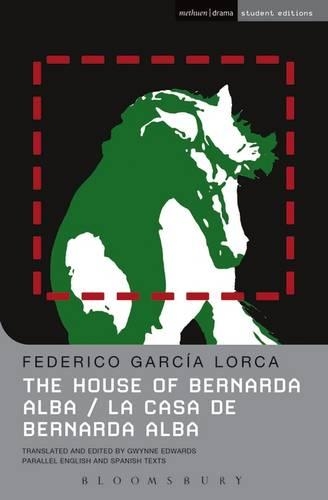
The House Of Bernarda Alba: La casa de Bernarda Alba
(Paperback)
Available Formats
Paperback
Published: 25th January 2024
Paperback
Published: 14th June 2001
Paperback
Published: 1st November 2007
Publishing Details
The House Of Bernarda Alba: La casa de Bernarda Alba
By (Author) Federico Garca Lorca
Edited by Prof Gwynne Edwards
Translated by Prof Gwynne Edwards
Introduction by Prof Gwynne Edwards
Edited by Prof Gwynne Edwards
Bloomsbury Publishing PLC
Methuen Drama
1st November 2007
United Kingdom
Classifications
Tertiary Education
Non Fiction
Literary studies: plays and playwrights
862.62
Physical Properties
Paperback
208
Width 128mm, Height 196mm, Spine 13mm
234g
Description
Bernarda Alba is a widow, and her five daughters are incarcerated in mourning along with her. One by one they make a bid for freedom, with tragic consequences. Lorca's tale depicts the repression of women within Catholic Spain in the years before the war.
The House of Bernarda Alba is Lorca's last and possibly finest play, completed shortly before he was murdered by Nationalist sympathisers at the outbreak of the Spanish Civil War. Inspired by real characters and described by the author as 'a true record of village life', it is a tragic tale of frustration and explosive passions in a household of women rulled by a tyrannical mother.
Edited with invaluable student notes - a must for students of Spanish drama
Reviews
'Best of all is Ann Mitchell's superb Bernarda Alba, who presides over her daughters like a malevolent mother superior. As polished and shiney as her own furniture, a husk of a woman who puts pride and honour before love and generosity, and who is so out of touch with her own heart that she ignores all the signs of the coming disaster, content to rule her house with her eyes wide shut.' Lyn Gardner, Gaurdian, 30 April 2009 It is a play about what happens to hearts when they are walled up and denied the opportunity to sweel with love and happiness' Lyn Gardener, Gaurdian, 30 April 2009
Author Bio
Federico Garca Lorca was born in 1898, in Andalusia, Spain. A poet and dramatist, and also a gifted painter and pianist, his early popular ballads earned him the title of 'poet of the gypsies'. In 1930 he turned his attention to theatre, visiting remote villages and playing classic and new works for peasant audiences. In 1936, shortly after the outbreak of Civil War, he was murdered by Nationalist partisans. His body was never found.
